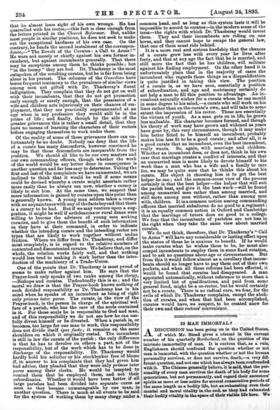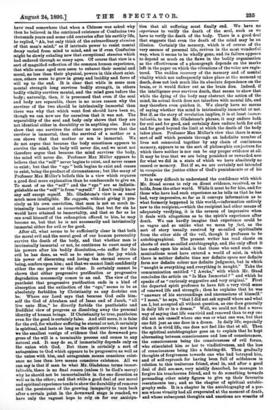IS MAN TATMORTAL ?
ADISCUSSION has been going on in the United States, of which Mr. Stead gives a résumé in the current number of his quarterly Borderland, on the question of the intrinsic immortality of man. It is curious that, as a rule, Englishmen should confound the question whether or not man is immortal, with the question whether or not the human personality survives, or does not survive, death,—a very dif- ferent question, and not one which has always been confounded with it. The Chinese generally believe, it is said, that the per- sonality of every man survives the death of his body for some generations, but not permanently, and regard their ancestors' spirits as more or leas active for several consecutive periods of the same length as a bodily life, but as exhausting even their mental and moral vitality in the end, as they had exhausted their bodily vitality in the space of their visible life here. We have read somewhere that when a Chineae was asked why then he believed in the continued existence of Confucius two thousands years and some odd centuries after his earthly life, he replied, ".A.h, but only think of the extraordinary stamina of that man's mind," as if intrinsic power to resist mental decay varied from mind to mind, and as if even Confucius might be slowly exhaling now that exceptional stamina which had endured through so many ages. Of course that view is a sort of magnified reflection of the common human experience, that while some aged men seem to exhaust their mental and moral, no less than their physical, powers in this short exist. ence, others seem to grow in grasp and lucidity and force of will up to the end. It is clear that while in some men mental strength long survives bodily strength, in others bodily vitality survives mental, and the mind goes before the body; naturally, then, it is presumed that even if the soul and body are separable, there is no more reason why the survivor of the two should be intrinsically immortal than there was why that which went first should have been so, though we can now see for ourselves that it was not. The separability of the soul and body only shows that they are not identical either in durability or in anything else. But to show that one survives the other no more proves that the survivor is immortal, than the survival of a mother or a son shows that that mother or son is immortal. We do not argue that because the body sometimes appears to survive the mind, the body will never die, and we must not therefore argue that because the mind survives the body, the mind will never die. Professor Max Muller appears to believe that the "sell" never begins to exist, and never ceases to exist ; but that the " ego " both begins to exist and ceases to exist, being the product of circumstances ; but like many of Professor Max Muller's beliefs this is a view which requires a good deal more explanation than he condescends to give us. To most of us the "self" and the " ego " are as indistin- guishable as the " self " is from "myself." I don't really know any self except myself. Mr. Gladstone's view is as usual much more intelligible. He suggests, without giving it pre- cisely as his own conviction, that man is not so much in- trinsically immortal as imnwrtalisable, that but for sin he would have attained to immortality, and that so far as he can avail himself of the redemption offered to him, he may become so, but that he is not necessarily and intrinsically immortal either for evil or for good.
After all, what seems to be sufficiently clear is that both the moral evil and the moral good of our human personality survive the death of the body, and that whether man is intrinsically immortal or not, he continues to exert many of his powers after his bodily dissolution,—to suffer for the evil he has done, as well as to enter into the joy which his power of discerning and loving the eternal source of being, confers upon him; and that we cannot limit confidently either the one power or the other. It certainly cannot be shown that either progressive purification or progressive degradation necessarily comes to an end. The view of the pantheist that progressive purification ends in a kind of absorption and the extinction of the "ego," seems to be as absolutely forbidden by Christianity as any doctrine can be. Where our Lord says that because God calls him- self the God of Abraham and of Isaac and of Jacob, "all live unto Him," he directly forbids the pantheistic and Buddhist view of progress as dissolving away the personal identity of human beings. If Christianity be true, pantheism even for the good is certainly false. And still more, it is false for the evil, for whether suffering be eternal or not, it certainly is spiritual, and lasts as long as the spirit survives; nor have we the smallest vestige of evidence that the downward pro- gress of the will is a terminable process and comes to any natural end. It may do so, if immortality depends only on the union with God. But there is certainly a sort of antagonism to God which appears to be progressive as well as the union with him, and antagonism means conscious exist- ence no less than love means conscious existence. All we can say is that if man be what Mr. Gladstone terms immor- talisable, there is no final reason (unless it be God's mercy) why he should not be immortalisable in the one direction as well as in the other ; and that while a good deal of our moral and spiritual experience tends to show the durability of remorse and the persistence of the growing incapacity to turn back after a certain point in the downward stage is reached, we have only the vaguest hope to rely on for our anticipa- tion that all suffering must finally end. We have no experience to verify the death of the soul, such as we
have to verify the death of the body. There is a good deal that suggests that even the death of the mind may be an illusion. Certainly the memory, which is of course of the very essence of personal life, revives in the most wonderful
way, when it seems to be wholly gone, and its failure appears to depend as much on the flaws in the bodily organisation as the effectiveness of a phonograph depends on the marks left in the paper on which the vibrations of the voice are regis- tered. The sudden recovery of the memory and of mental vitality which not unfrequently takes place at the moment of death, does not look much like its absolute dependence on the brain, or it would flicker out as the brain dies. Indeed, if the intelligence ever survives death, that seems to show that while the dying of the body may obstruct the action of the mind, its actual death does not interfere with mental life, and may therefore even quicken it. We clearly have no means of saying whether the mind is intrinsically immortal or not. But if, as the story of revelation implies, it is at least tatmor- talisable, to use Mr. Gladstone's phrase, it may endure both for evil and for good, and certainly does endure both for evil and for good beyond the limit at which the death of the body takes place. Professor Max Miiller's view that there is some sort of self which persists through an indefinite number of lives not connected together by any chain of continuous memory, appears to us the sort of philosophic conjecture for which there neither is nor can be any proper evidence at all. It may be true that we are being punished or rewarded now for what we did in a state of which we have absolutely no record or memory. But if so, we are certainly not intended to recognise the justice either of God's punishments or of his rewards.
It is very difficult to understand the confidence with which Mr. Stead seems to rely on direct evidence, received, as he holds, from the other world. While it must be for him, and for those who have had such experience as he tells us that he has had, very impressive, so far as it conveys information as to what formerly happened in this world,—information entirely new to the recipient,—which the recipient had other means of adequately verifying, it is the reverse of impressive when it deals with allegations as to the spirit's experience after death. We can hardly imagine that experience could be so vague and so unlike what we mean by fact, as the sort of story usually received by so-called spiritualists from the other side of the veil, though it professes to be autobiographical. The present writer has read sheets on sheets of such so-called autobiography, and the only effect it has made upon his mind, is that those who send such com- munications must have entered a world of mist, in which there is neither definite time nor definite space nor definite form nor definite colour nor definite judgment, but in which "naught is everything and everything is naught." Take the communication entitled "I Awoke," with which Mr. Stead concludes the article on "Is Man Immortal ? " and which he speaks of as "curiously suggestive and very original." First the departed spirit professes to have felt a very vivid sense of renewed life and strength ; then he explains that he was "unaware of his surroundings and unconscious of himself." "I mean," he says, "that I did not ask myself where and what am I, but accepted all without question, as one does generally in daily life or in a dream." Well, we could not find a worse way of saying that life was vivid and renewed than to say one did not ask oneself where one was or what one was, but that one felt just as one does in a dream. In daily life, especially when it is vivid life, one does not feel like that at all. Then the spiritual autobiographer goes on to explain that be kept alternating between consciousness and loss of consciousness, the consciousness being the consciousness of evil forms, who stimulated him or her to vindictiveness, and the loss of consciousness being like a fainting-fit. Then gradually thoughts of forgiveness towards one who had betrayed him, and of sell-reproach for having been full of selfishness in relation to this traitorous friend, steal in, and after a good deal of dull see-saw, very mistily described, he manages to forgive his treacherous friend, and to do something towards persuading other misty figures to give up their favourite resentments too ; and so the chapter of spiritual autobio- graphy ends. It is a chapter in the autobiography of a per- son whose vivacity had all evaporated at the moment of death, and whose subsequent thoughts and emotions are wreaths of
mist. If this is real life in the future world, we fear all that makes existence vivid and graphic must end with this. In fact, the so-called accounts given of the other world are the accounts of a life which has ceased altogether to be definite, and begun to copy the billowy shapes of cumulus clouds. The older ghosts are altogether more impressive than the modern ghosts who telegraph their experience by automatic writing, and succeed only in dissolving thought and dis- sipating language.




































 Previous page
Previous page